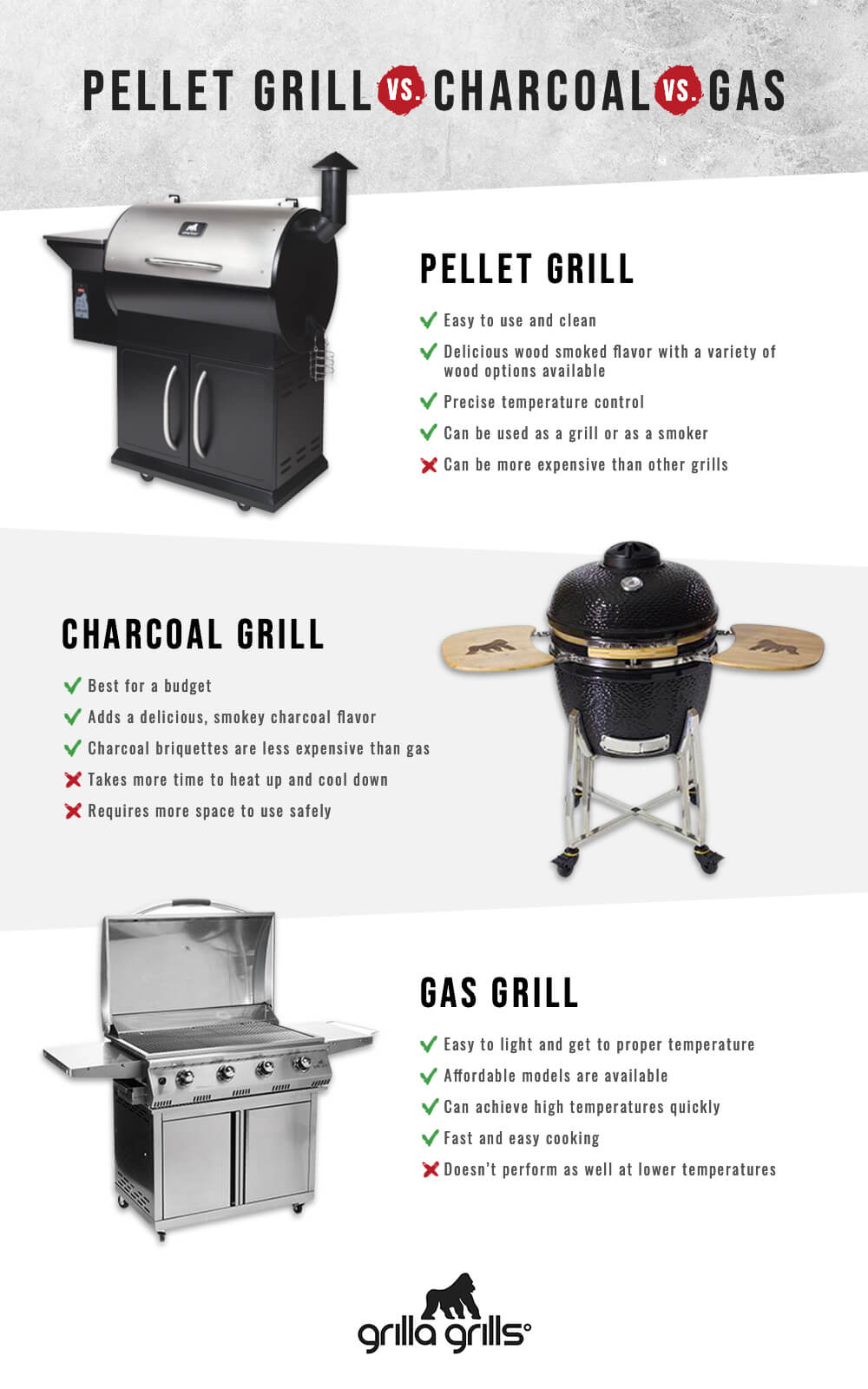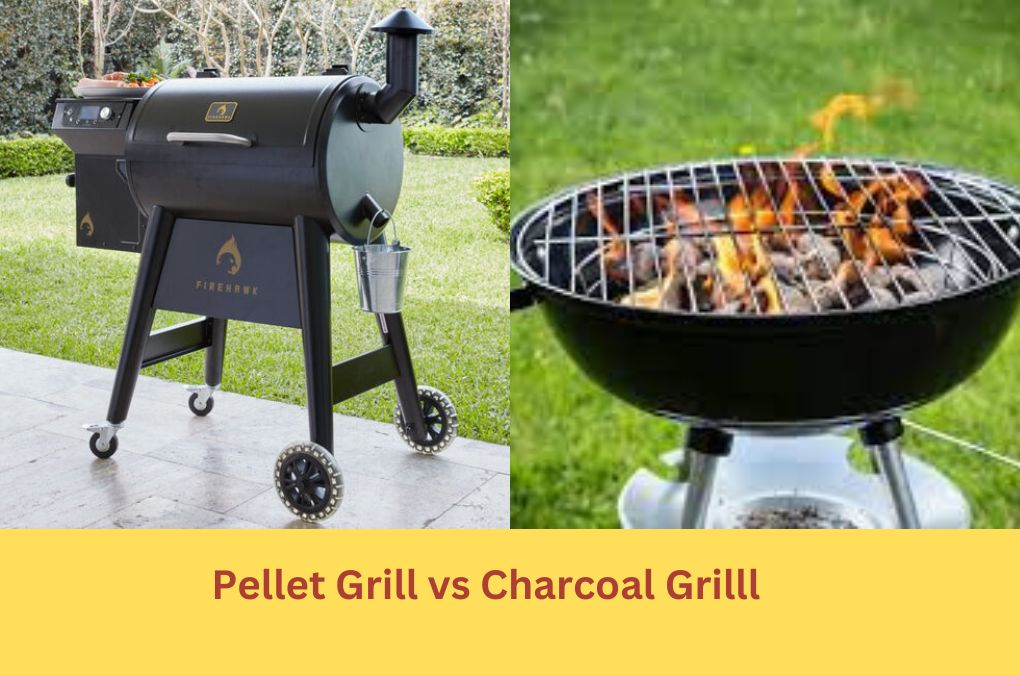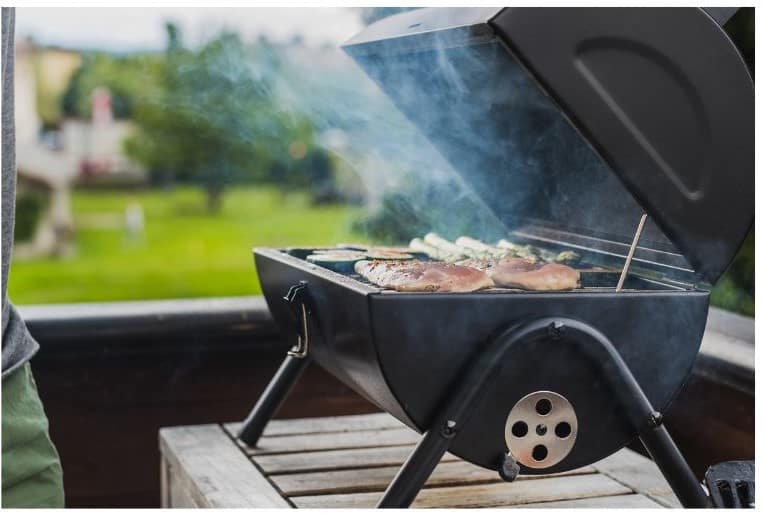In the ever-evolving world of grilling, enthusiasts are faced with a tantalizing array of options, each promising a unique culinary experience. One of the age-old debates centers around the battle between pellet grills and charcoal grills, both revered in their own right for distinct reasons. As the aroma of smoky barbecues wafts through the air, the question lingers: Is a pellet grill better than a charcoal grill? Join us on a journey as we delve into the nuances of these two popular grilling methods, dissecting their strengths, flavors, and overall appeal to help you make an informed decision for your next backyard cooking adventure.
Pellet Grills Offer Several Advantages over Charcoal Grills
-
Firstly, they provide precise temperature control, allowing you to cook your food evenly.
-
Secondly, they offer convenience with automated features like temperature monitoring and pellet feeding.
-
Thirdly, pellet grills produce less ash and require less cleanup compared to charcoal grills.
-
Additionally, pellet grills offer a wider range of cooking options, including smoking, roasting, and baking. Finally, pellet grills are more versatile as they can be used for both grilling and smoking.

Pellet Grills: A Modern Twist on Grilling
Pellet grills have gained popularity in recent years, offering a unique grilling experience that combines the convenience of gas grills with the smoky flavor of charcoal grills. These grills use wood pellets as fuel, which are loaded into a hopper and automatically fed into the firepot. The temperature can be easily controlled with the help of a built-in thermostat, allowing you to set it and forget it.
One of the biggest advantages of pellet grills is their versatility. They can be used for grilling, smoking, roasting, and even baking. With the ability to maintain a consistent temperature, you can achieve perfect results every time. Additionally, pellet grills are known for producing a rich and smoky flavor that is highly sought after by grill enthusiasts.
While pellet grills offer convenience and flavor, they do come with a few drawbacks. First and foremost, they require a power source to operate. This means that you’ll need access to electricity or a generator to use a pellet grill. Secondly, the cost of wood pellets can add up over time, especially if you’re an avid griller. However, many people find that the benefits outweigh these minor inconveniences, making pellet grills a great choice for those who want a hassle-free grilling experience.
Charcoal Grills: The Classic Choice
When you think of grilling, chances are a charcoal grill immediately comes to mind. These grills have been around for ages and have a timeless appeal for many grill enthusiasts. Charcoal grills use charcoal briquettes or lump charcoal as their fuel source, offering a distinct smoky flavor that many people love.
One of the biggest advantages of charcoal grills is their high heat output. They can reach extremely high temperatures, making them ideal for searing steaks or achieving that perfect char on your burger. Additionally, charcoal grills are generally more affordable than pellet grills, which can be a major deciding factor for budget-conscious individuals.
On the flip side, charcoal grills require more time and effort to operate. You’ll need to light the charcoal and wait for it to burn down to the desired cooking temperature, which can take some practice to master. Additionally, charcoal grills often require more attention throughout the cooking process to maintain an even temperature and prevent flare-ups.
Flavor Showdown: Pellet Grill vs. Charcoal Grill
When it comes to flavor, both pellet grills and charcoal grills have their strengths. Pellet grills produce a smoky flavor that is more consistent and predictable, thanks to the controlled temperature. The type of wood pellets used can also impact the flavor, allowing for a variety of options. On the other hand, charcoal grills provide a more intense and robust smoky flavor, which many purists prefer.
Ultimately, the choice between a pellet grill and a charcoal grill comes down to personal preference. If convenience and versatility are important to you, a pellet grill may be the better choice. However, if you value tradition and a deep smoky flavor, a charcoal grill might be the way to go. Whichever grill you choose, remember that the key to great grilling lies in the technique and ingredients you use.
Factors to Consider When Choosing a Grill
1. Cooking Style: Consider how you plan to use the grill. If you enjoy experimenting with different cooking techniques and flavors, a pellet grill might be the better option. If you prefer traditional grilling and value high heat for searing a charcoal grill may be more suitable.
2. Convenience: Think about how much time and effort you’re willing to invest. Pellet grills offer set-it-and-forget-it convenience, while charcoal grills require more hands-on attention and preparation.
3. Budget: Consider your budget and the long-term costs associated with each type of grill. Pellet grills tend to have a higher upfront cost and ongoing expenses for wood pellets, while charcoal grills are generally more affordable.
Pellet Grill vs. Charcoal Grill: Which One Should You Choose?

Now that we’ve explored the features and characteristics of pellet grills and charcoal grills, it’s time to make a decision. Remember, there is no definitive answer to which grill is better—it all depends on your personal preferences and needs. If you prioritize convenience, versatility, and consistent temperature control, a pellet grill may be the best choice for you. On the other hand, if you enjoy the classic smoky flavor, high heat, and a more hands-on grilling experience, a charcoal grill might be the perfect fit. Ultimately, the most important thing is to enjoy the process of grilling and the delicious meals that result from it.
The Benefits of Grilling
Grilling is not only a popular cooking method, but it also comes with many benefits. Here are a few reasons why grilling is a great way to prepare your food:
1. Healthier Cooking: Grilling allows excess fat to drip away from the food, making it a healthier cooking option compared to frying or sautéing.
2. Enhanced Flavor: Grilling creates a unique smoky flavor that enhances the taste of your food, making it more enjoyable.
3. Versatile Cooking: From juicy steaks to grilled vegetables, grilling offers endless possibilities when it comes to preparing a wide variety of foods.
4. Outdoor Experience: Grilling allows you to enjoy the outdoors and socialize while preparing meals for family and friends.
5. Time-Saving: Grilling typically requires less cooking time compared to other methods, allowing you to enjoy your meal faster.
Tips for Grilling Success
Whether you choose a pellet grill or a charcoal grill, here are some tips to help you achieve grilling success:
1. Preheat the Grill: Ensure your grill is properly preheated before adding the food. This helps to sear the meat and prevents it from sticking.
2. Use the Right Tools: Invest in high-quality grilling tools such as long tongs, a spatula, and a meat thermometer to make your grilling experience easier and more enjoyable.
3. Control the Flames: Avoid flare-ups by keeping a close eye on the grill and adjusting the vents or flame height as needed.
4. Let it Rest: Allow grilled meats to rest for a few minutes before serving to allow the juices to redistribute and ensure maximum tenderness.
5. Experiment with Flavors: Don’t be afraid to try different marinades, rubs, and seasonings to elevate the flavor of your grilled dishes.
The Rise of Pellet Grills
How Pellet Grills Are Changing the Grilling Game
Pellet grills have revolutionized the way we grill, offering a blend of convenience, versatility, and flavor that has won over many grill enthusiasts. Their popularity continues to rise, and for good reason. Here are some factors contributing to the rise of pellet grills:
1. Temperature Control: Pellet grills make it easy to set and maintain a specific temperature, allowing for more precise cooking and consistent results.
2. Multi-Functional Design: The ability to grill, smoke, roast, and bake all in one unit makes pellet grills a versatile option for outdoor cooking.
3. Ease of Use: Pellet grills are often praised for their user-friendly design, with features like push-button ignition and automated pellet feeding. This makes them accessible to grillers of all experience levels.
4. Smoky Flavor: Pellet grills use natural wood pellets, which infuse food with a distinct smoky flavor that many people find irresistible.
5. Increased Availability: As the demand for pellet grills grows, more manufacturers are entering the market, making them more readily available to consumers.
Are Pellet Grills the Future of Grilling?
While pellet grills have certainly made an impact on the grilling scene, it’s difficult to say whether they will completely replace charcoal grills or gas grills in the future. Each type of grill offers a unique grilling experience, and personal preferences will always play a role in determining which grill is chosen. However, as technology continues to evolve, we may see advancements in pellet grills that further solidify their place in the grilling world.
In conclusion, when comparing a pellet grill to a charcoal grill, both have their own strengths and weaknesses. It ultimately comes down to personal preference, cooking style, convenience, and budget. Whether you choose a pellet grill or a charcoal grill, the most important thing is to enjoy the process of grilling and savor the delicious flavors that come from cooking outdoors. Happy grilling!
Key Takeaways: Is a Pellet Grill Better Than a Charcoal Grill?
When it comes to choosing between a pellet grill and a charcoal grill, there are a few key differences to consider:
-
A pellet grill offers convenience and ease of use, as it uses wood pellets and an automated system to control temperature.
-
A charcoal grill provides a traditional cooking experience and imparts a smoky flavor to the food.
-
Pellet grills offer precise temperature control, allowing for consistent cooking results.
-
Charcoal grills require more manual effort to control temperature and may require additional accessories for enhanced temperature control.
-
Pellet grills are versatile and can be used for grilling, smoking, roasting, and even baking.
Frequently Asked Questions
Are you considering investing in a new grill but can’t decide whether to go for a pellet grill or a charcoal grill? Let’s explore some common questions to help you make an informed choice.
1. What are the main differences between a pellet grill and a charcoal grill?
When it comes to fuel, pellet grills use wood pellets, while charcoal grills rely on charcoal. Pellet grills are known for their convenience, as they can maintain consistent temperatures without needing constant monitoring. Charcoal grills, on the other hand, provide a more traditional grilling experience that many people enjoy, with the added benefit of producing a smoky flavor.
Another key difference is versatility. Pellet grills can be used for various cooking techniques, including smoking, grilling, roasting, and baking. Charcoal grills are primarily used for grilling, although some models offer additional features like smoking capabilities.
2. Which grill type offers better temperature control?
If precise temperature control is important to you, a pellet grill might be the better option. These grills typically have digital controllers that allow you to set and maintain your desired temperature with minimal fluctuations. Charcoal grills, on the other hand, rely on manually adjusting the airflow, which can require more attention to maintain a steady temperature.
However, it’s worth noting that experienced grillers who are familiar with charcoal grills can still achieve excellent temperature control by using techniques like the two-zone fire or a quality airflow control system.
3. Which grill type is easier to use?
When it comes to ease of use, pellet grills have the upper hand. With their automated temperature control, you simply set the desired temperature and let the grill do the work. Some models even have Wi-Fi capabilities, allowing you to monitor and control the grill from your smartphone.
Charcoal grills require more manual effort to light the charcoal, manage the heat, and maintain the temperature. However, for some grill enthusiasts, the process of building and tending to the fire is part of the enjoyment.
4. Which grill type provides a better flavor?
Both pellet grills and charcoal grills can produce delicious flavors, but they offer different profiles. Pellet grills often impart a mild smoky flavor, while charcoal grills tend to provide a more robust and traditional smoky taste. The type of wood pellets used in a pellet grill can influence the flavor as well.
Ultimately, the flavor preference comes down to personal taste. Some barbecue purists argue that the authentic charcoal flavor cannot be replicated, while others appreciate the convenience and consistent results of pellet grills.
5. Which grill type is more suitable for beginners?
For beginners, pellet grills tend to be more user-friendly. With their temperature control features and ease of use, they offer a smoother learning curve. The ability to set and maintain a specific temperature takes the guesswork out of grilling and allows beginners to focus on other aspects of cooking, such as seasoning and food preparation.
That being said if you are passionate about the traditional grilling experience and are willing to dedicate time to learn the art of charcoal grilling, a charcoal grill can certainly be a rewarding choice for beginners as well. It just requires a bit more practice and attention to detail.
To wrap up, it’s important to maintain a professional tone while using language that is easy for a 13-year-old reader to understand. We want to avoid jargon and keep the writing conversational. With concise sentences that convey a single idea in each, we can ensure that readers leave with a clear understanding of the article’s key points. Overall, it’s crucial to keep the reader engaged by using a tone that is both relatable and informative. By following these guidelines, we can effectively communicate the message to our audience and leave them with a clear understanding of the article’s main points



